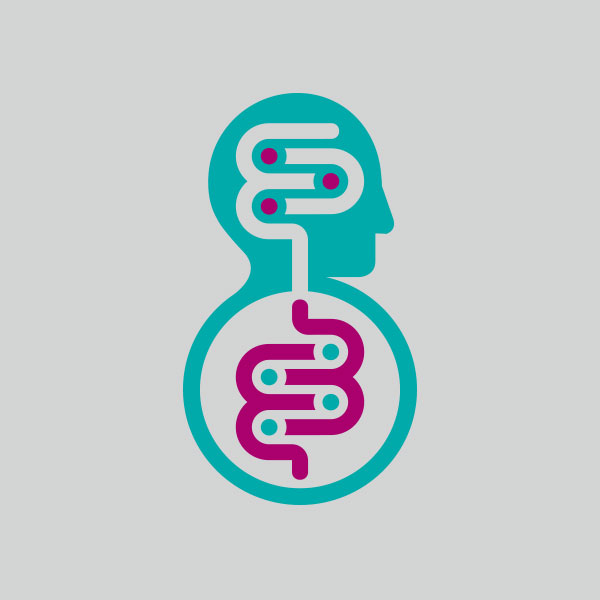
The number of patients with mental disorders worldwide is increasing. Therefore, more and more research is focussing on understanding the causes of these diseases and developing better treatments. One key factor that we are studying in this context is the microbiota that live in the gut. This new approach arises because gut microbiota influences various normal mental processes. When these mental processes don’t function well, this can cause mental disorders [1].
It is currently known that when the microbiota are not well developed, disturbed, or harmed, dysfunction can appear in the digestive system, immune system, endocrine system, nervous system, and even in behaviour and cognition [3]. In relation to mental health, research findings indicate that maturation and function of the brain and mind are impacted by the gut microbiota [4], because it develops almost simultaneously with the brain. The microbiota not only regulate the structure and function of the gut-brain, but also influence the development of the brain and behaviour [5], and microbiota disturbances at different stages can induce different brain and mental disorders [6]. Social aspects should also be taken into consideration. We live in a changing society in which dietary structure, dietary habits, and food processing have experienced great changes following modernization, and these alterations have significantly influenced the gut microbiota [2].
Within the field of mental health, the role of gut microbiota is often ignored, but we now know that it plays a significant role in a person’s mind and behaviour [4]. I will highlight some important processes where gut microbiota are known to be of influence.
First, the gut microbiota regulates pain perception. Many pain-related disorders, such as functional abdominal pain, migraine, and chronic back pain, are strongly linked with abnormal gut microbiota [7].
Probiotics, which are live microorganisms that promote the growth of healthy gut microbiota, are known to improve cognitive functions such as learning capacity and memory [4][8]. In the field of mood and emotion, unsettling the gut microbiota increases anxiety-like and depression-like behaviours [9]. Meanwhile, supplementing with certain probiotics, prebiotics (substances that serve as food for gut microbiota to grow), or fermented foods reduces negative behaviours and improves these emotions [4][10].
Temperament and character are also affected by microbiota. Among adults, high neuroticism and low conscientiousness are correlated with the high abundance of specific and different bacteria. Meanwhile, high conscientiousness is associated with an increased abundance of butyrate-producing bacteria [11].
It is more commonly known that stress management is impacted by the gut microbiota specifically, the gut microbiota is a part of the stress response system [12]. Psychological stresses destroy mood and disturb the gut microbiota [13]. Specifically, a brain region called the amygdala remarkably impacted by the gut microbiota [14]. The amygdala plays a crucial part in stress-related mood and behaviour response as well as in emotion regulation.
To conclude, you can yourself take action in improving your gut microbiota, your mood and emotion, and your stress management. Consume foods that naturally provide you with probiotics and prebiotics. Include in your daily diet legumes, bananas, tomatoes, onions, artichokes, and leeks to increase the probiotics, and do not forget to include fermented food such as yogurt, kefir, miso, soft cheeses, sourdough bread, sauerkraut, and pickles to increase your probiotics. You can read this tipsheet to obtain more information about how to help your gut microbiome.
References
- Liang, S., Wu, X. and Jin, F. (2018). Gut-Brain Psychology: Rethinking Psychology From the Microbiota–Gut–Brain Axis. Front Integr Nurosci; 12: 33. doi: 10.3389/fnint.2018.00033.
- Statovci, D., Aguilera, M., MacSharry, J., and Melgar, S. (2017). The impact of western diet and nutrients on the microbiota and immune response at mucosal interfaces. Front. Immunol. 8:838. doi: 10.3389/fimmu.2017.00838.
- Crumeyrolle-Arias, M., Jaglin, M., Bruneau, A., Vancassel, S., Cardona, A., Dauge, V., et al. (2014). Absence of the gut microbiota enhances anxietylike behavior and neuroendocrine response to acute stress in rats. Psychoneuroendocrinology 42, 207–217. doi: 10.1016/j.psyneuen.2014.01.014
- Vuong, H. E., Yano, J. M., Fung, T. C., and Hsiao, E. Y. (2017). The microbiome and host behavior. Ann. Rev. Neurosci. 40, 21–49. doi: 10.1146/annurev-neuro-072116-031347.
- Carlson, A. L., Xia, K., Azcarate-Peril, M. A., Goldman, B. D., Ahn, M., Styner, M. A., et al. (2018). Infant gut microbiome associated with cognitive development. Biol. Psychiatry 83, 148–159. doi: 10.1016/j.biopsych.2017.06.021
- Dinan, T. G., and Cryan, J. F. (2017). Gut instincts: microbiota as a key regulator of brain development, ageing and neurodegeneration. J. Physiol. 595, 489–503. doi: 10.1113/JP273106
- Dai, Y. J., Wang, H. Y., Wang, X. J., Kaye, A. D., and Sun, Y. H. (2017). Potential beneficial effects of probiotics on human migraine headache: a literature review. Pain Physician 20, E251–E255.
- Wang, T., Hu, X., Liang, S., Li, W., Wu, X., Wang, L., et al. (2015). Lactobacillus fermentum NS9 restores the antibiotic induced physiological and psychological abnormalities in rats. Benef. Microbes 6, 707–717. doi: 10.3920/BM2014.0177
- Slykerman, R. F., Thompson, J., Waldie, K. E., Murphy, R., Wall, C., and Mitchell, E. A. (2017). Antibiotics in the first year of life and subsequent neurocognitive outcomes. Acta Paediatr. 106, 87–94. doi: 10.1111/apa.13613
- McKean, J., Naug, H., Nikbakht, E., Amiet, B., and Colson, N. (2017). Probiotics and subclinical psychological symptoms in healthy participants: a systematic review and meta-analysis. J. Altern. Complement. Med. 23, 249–258. doi: 10.1089/acm.2016.0023.
- Kim, H. N., Yun, Y., Ryu, S., Chang, Y., Kwon, M. J., Cho, J., et al. (2017). Correlation between gut microbiota and personality in adults: a cross-sectional study. Brain Behav. Immun. 69, 374–385. doi: 10.1016/j.bbi.2017.12.012
- Luczynski, P., McVey Neufeld, K. A., Oriach, C. S., Clarke, G., Dinan, T. G., and Cryan, J. F. (2016). Growing up in a bubble: using germfree animals to assess the influence of the gut microbiota on brain and behavior. Int. J. Neuropsychopharmacol. 19:pyw020. doi: 10.1093/ijnp/pyw020
- Bharwani, A., Mian, M. F., Foster, J. A., Surette, M. G., Bienenstock, J., and Forsythe, P. (2016). Structural & functional consequences of chronic psychosocial stress on the microbiome & host. Psychoneuroendocrinology 63, 2010–2025. doi: 10.1016/j.psyneuen.2015.10.001.
- Hoban, A. E., Stilling, R. M., Moloney, G., Shanahan, F., Dinan, T. G., Clarke, G., et al. (2017). The microbiome regulates amygdala-dependent fear recall. Mol. Psychiatry 23, 1134–1144. doi: 10.1038/mp.2017.100
